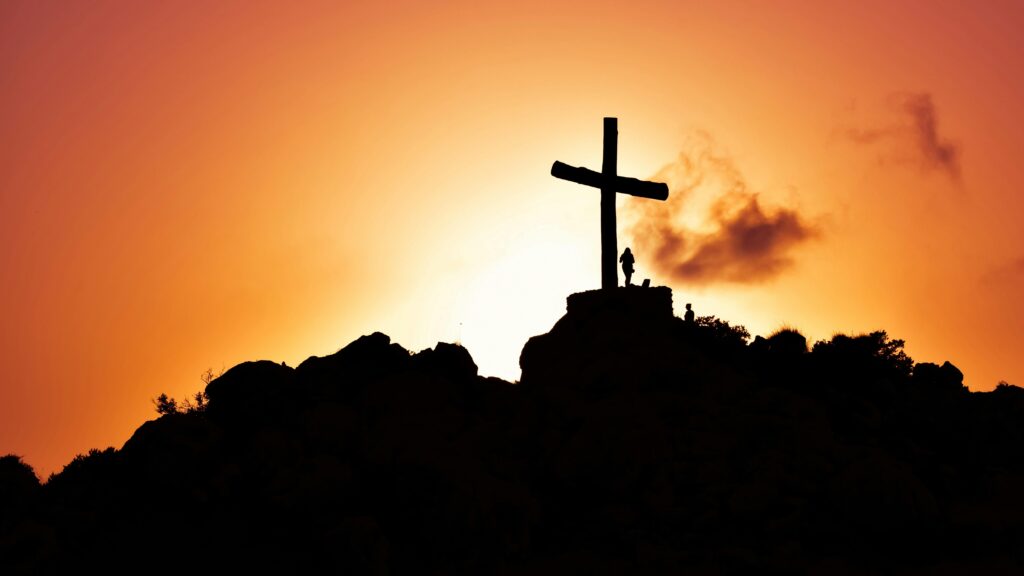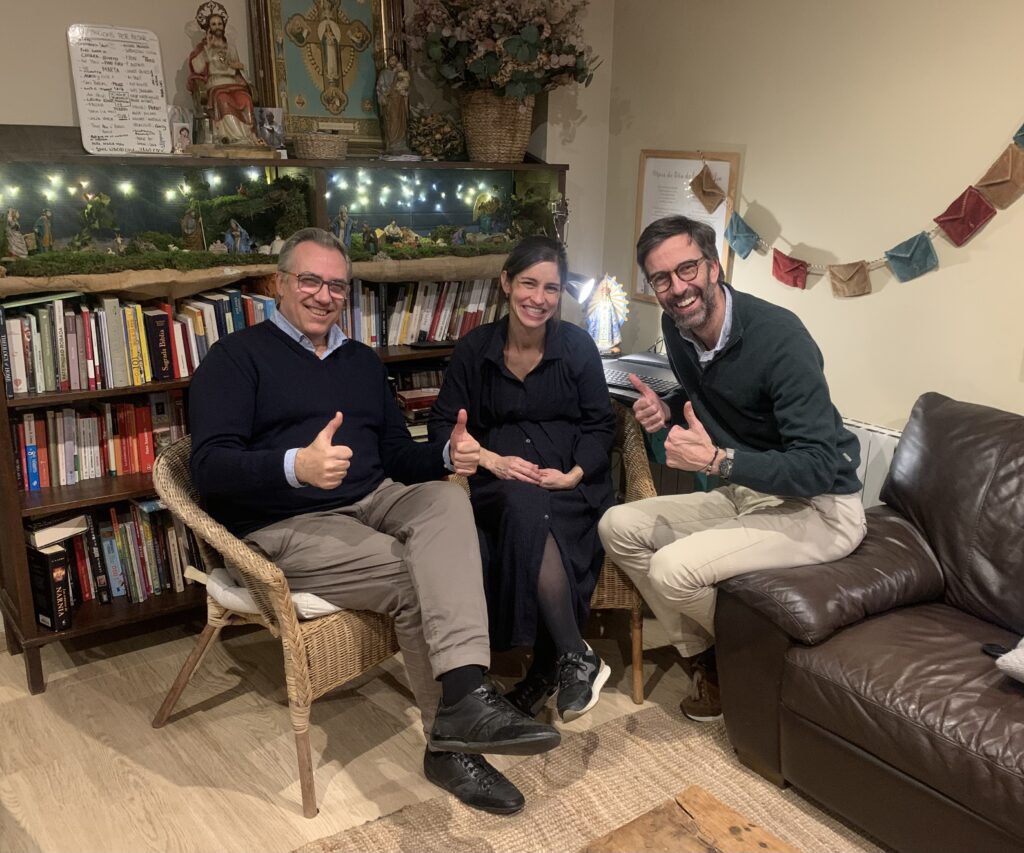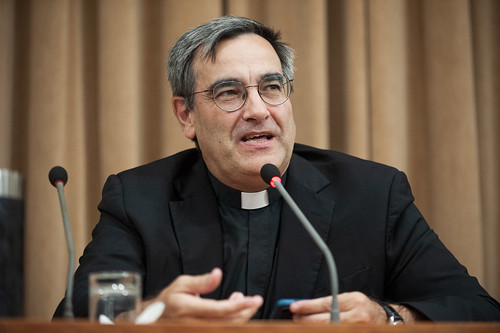Earn Heaven
Testimonies of the truth
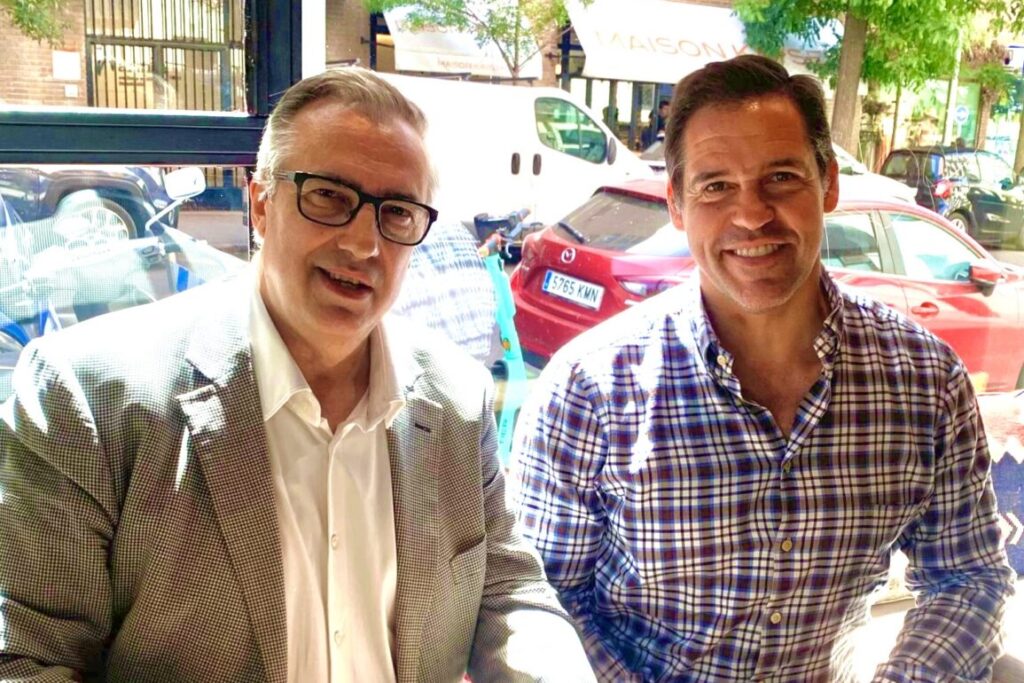
Albert Cortina talks on this occasion with Luis Alfonso de Borbón y Martínez-Bordiú. He has an extensive family tree with a very relevant historical component. Luis Alfonso is the heir to the throne of France. Considered by his followers as Louis XX of France. He also holds the title of Duke of Anjou and other noble titles and Spanish and French honorary distinctions. He is married to María Margarita Vargas, with whom he has had four children: Eugenia, Luis, Alfonso, and Enrique. The family resides in Madrid.
Luis Alfonso, you surely remember that passage from the Gospel of Matthew where Jesus, taking advantage of the encounter with a rich young man, teaches his apostles the need to have a detached heart. “Truly I say to you: it is difficult for a rich man to enter the Kingdom of Heaven. “I tell you, it is easier for a camel to go through the eye of a needle than for a rich man to enter the kingdom of God.” How do you think we can have a heart detached from ourselves and material things, to let God enter our hearts?
This passage from Matthew reflects one of Jesus’ most profound teachings about wealth, humility and detachment. The rich young man, whom Jesus asks to sell everything he has and give it to the poor to follow him, represents those who, although they seek good and want to live according to God’s commandments, are tied to their possessions and status.
We must be aware that everything we have is a gift from God: wealth, achievements, material possessions, and even our own life. We have received everything to manage responsibly and generously. This recognition helps us put into perspective what really matters and to stop clinging to material things.
Detachment is not only about giving up material things, but also about cultivating a generous attitude, sharing what we have with others – especially those most in need – and being willing to serve.
In this sense, prayer frees us from dependence on the world and focuses our being on what is eternal. Contemplation helps us to recognize the presence of God in all things and invites us to live with greater serenity, without clinging to what is ephemeral.
Instead of focusing on the accumulation of material goods, we must focus on what is eternal, on justice, on love for our neighbor, and on the inner peace that faith gives us.
In this way, detachment is closely linked to humility and implies an attitude of service and a renunciation of our ego.
Finally, detachment also has to do with full confidence that God will provide what we need. This does not mean that we should not strive or work, but that we should live without anxiety about the future, knowing that God takes care of us.
Many times, we Catholics are somewhat hesitant to bear witness to our relationship with God. We keep this fundamental aspect of our lives in the privacy of our hearts. However, if you think it is appropriate, I would like you to tell us when you think you had the authentic personal encounter with Jesus that transformed your spiritual life.
My spiritual life began from the moment I was baptized by the will of my parents. There have been many people who have contributed something to that journey: my “nanny,” my parents, my grandparents, my uncles, the various religion teachers, some priests, etc. As I have matured, the decisions made by my parents – for example, baptism and communion – have been reinforced by my own decisions in confirmation, marriage and in the education of our children, with the support of Margarita, my wife. Throughout this time I have been deepening my spiritual journey, that is, my relationship with God, which like every relationship has had its ups and downs due to the different vicissitudes of life and the trials I have encountered.
The most intense personal encounter with Jesus I experienced was when I did the Emmaus retreat. My wife, who had done it a few years before, tried to encourage me to do it, and a few years later, my friend Javier suggested it to me without insisting too much and finally I decided to do it.
I didn’t really know what I was going for, but I told myself: “I have nothing to lose and a lot to gain from what I have heard.” My reflection was that, in the worst case, I would only lose forty-eight hours of my life. However, it was a fabulous experience, in which I met wonderful people: the so-called “servants” in the retreat, looked after us with exquisite treatment, made the activities and dynamics flow in the best way and gave us their support. On the other hand, the so-called “walkers” like me, who at first did not really know what we were going for, but who had an open mind to whatever was proposed to us, also turned out to be wonderful “brothers.”
I can tell you that the Emmaus retreat has allowed me to bear witness to my relationship with God. I have to confess that I was impressed by how I told strangers about the intimacies of my spiritual life that I had never told anyone before. Listening to the testimony of the servants and also of the other walkers is very striking.
Thus, the Emmaus retreat has allowed me to break the shell that I had put on – surely to protect myself – and thus express emotions, feelings and experiences of my relationship with God. The Emmaus retreat has brought me much closer to God, and has allowed me to integrate Him more deeply into my daily life.
Doing Emmaus has helped me to put things into perspective – looking beyond my own navel – making the pains and difficulties of life more bearable.
Finally, I can tell you that Emmaus has put me in contact with wonderful people.
As an entrepreneur, you have created several very fun board games. One of them is entitled “Earn Heaven” which helps to learn about the lives of the saints. Its objective is for children and adults to make friends with the great Catholic saints. This game is an enjoyable way to learn Christian values and virtues, which are valid for anyone: values such as love, generosity, dedication, solidarity, service or loyalty. How do you think the game you have created can bring us closer to God by having a first contact with the life and example of these great saints?
The game “Earn Heaven” – which focuses on the life and example of the saints – can be an excellent tool to get closer to God and to deepen our Christian life in an interactive and meaningful way with our friends in Heaven. Contact with the lives of the saints, who have been models of Christian virtues, can be a first step towards a greater understanding of the faith and a spiritual awakening.
If you allow me, I would like to explain to you in greater detail how a game like this can bring us closer to God and help us grow in our Christian life.
Indeed, the game “Earn Heaven,” by focusing on the lives of the saints, can be a very powerful tool to bring us closer to God, especially as it is for many a first interactive and playful contact with Christian life.
This game allows us to know, imitate and reflect the virtues of the saints in our own lives, inspiring us to live according to the example of those who have already achieved holiness. In addition, it helps us understand that we are all called to be saints, and that holiness is achieved in everyday life, in prayer, frequenting the sacraments, in the decisions we make and in the virtues we cultivate.
This type of game not only teaches about the lives of the saints, but also invites action and personal reflection, leading us to live closer to God and bring others closer to His infinite Love and Mercy.
“Play with God” is another game from the same collection, which reviews all the catechesis of our faith and allows us to learn about the Catholic religion in a fun way.

Image from the game “Earn Heaven”
As it could not be otherwise, your favorite saint is Saint Louis King of France, since you were born on the same day as him, although 760 years apart and it should be remembered that you are family. In addition, your respective wives are called Margaret. How would you define the ideal of a Christian monarch that Saint Louis represents?
The model of Saint Louis as a Christian monarch can be understood as a call to rulers to be not only political authorities, but also spiritual shepherds of their people. The Christian monarch is one who sees his power and authority as a service to God and humanity, who acts with justice, humility and charity, and who puts the Church and the good of the poorest and most needy at the centre of his government.
Today, the ideal of Saint Louis as a Christian monarch remains a model for political and religious leaders of our times. His life shows that kingship and leadership should not be based on power, but on the responsibility to serve others, promoting justice, peace and love in the name of God.
This is a model that transcends its medieval context, and is unquestionably applicable in the modern world, where political leaders can learn from Saint Louis’ commitment to social justice, the common good, the protection of the most vulnerable and the importance of faith in public life.
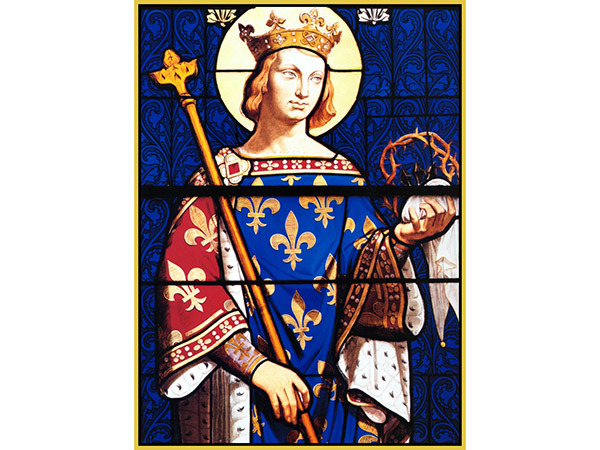
Saint Louis IX, King of France
If you agree, I will now select some of the 80 saints that appear in the game “Earn Heaven” so that you can reveal to us, through them, your ideal of sanctification in the midst of the world. Let’s start with the first: How do you understand the sanctification of the ordinary that St. Josemaría Escrivá, the founder of Opus Dei, proposed?
The sanctification of the ordinary, according to St. Josemaría, is a call to see the divine in the human, to turn our daily and routine activities into occasions to live the love of God, and to seek holiness in all the circumstances of our lives.
In the teachings of St. Josemaría, any task, however small or repetitive, can be a vehicle for the action of sanctifying Grace if it is lived with the intention of pleasing and glorifying God.
This message has enormous relevance today, when many people struggle to find purpose and meaning in their lives. In this sense, the proposal of sanctification of the ordinary invites us to transform the seemingly trivial into something transcendental and eternal, and reminds us that every action carried out with love for God has immeasurable value.
I am left with St. Josemaría’s idea that holiness is a universal call for everyone.
The parents of Saint Anthony of Padua were very rich and wanted to see their son as a distinguished man of high society. He, on the other hand, wanted to be poor for the love of Christ and that is why he became a Franciscan. This saint enjoys worldwide fame for performing prodigious acts, to the point that he is recognized as the greatest miracle worker (gift of performing miracles) of all time. What would you say to a son of yours who chose a life of Franciscan poverty as a consecrated religious?
If one of my sons chose a life of Franciscan poverty as a consecrated religious, he would have all my support and respect for his decision. I would express my admiration and pride for his courage and his desire to follow Christ, in a profound way, just as Saint Anthony of Padua did.
Following the radical path of Franciscan poverty is a decision full of love and commitment to God and to others. A decision like that of a son who chooses consecrated life is, for a father, a reminder that love for God and generosity of heart are the greatest treasures that a son can have and offer.
Saint Teresa of Jesus, also known as Saint Teresa of Avila, was a nun, founder of the Order of the Discalced Carmelites —a branch of the Order of Our Lady of Mount Carmel—, a mystic and a Spanish writer. This Saint, a doctor of the Church, wrote this well-known poem-prayer in her day: “Let nothing disturb you, let nothing frighten you, everything passes, God does not change, patience achieves everything; he who has God lacks nothing: God alone is enough.” How would you apply in your life the Carmelite spiritual journey that this great saint proposes, and specifically, how do you bring to your personal life this affirmation that “God alone is enough”?
Saint Teresa of Jesus’ affirmation that “God alone is enough” is a true declaration of trust and absolute dependence on God. For her, this phrase is part of the heart of her spiritual journey, and it contains the ideal of Christian life to which we should strive. Thus, neither the worries, nor the challenges of the world, nor riches, nor earthly pleasures, etc. are capable of fully filling the human heart as the presence of God does.
This spiritual path means learning to live with a constant awareness of the presence of God in all circumstances, to seek inner peace in Him and to fully trust in His Providence. Let nothing disturb us, let nothing frighten us, because when we have God, we have everything.
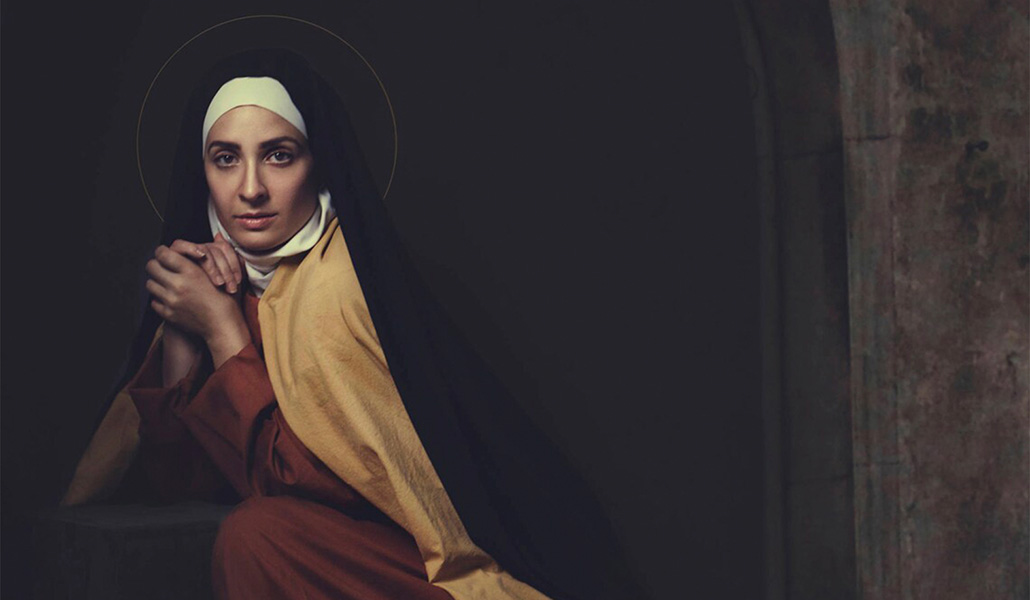
Saint Teresa of Avila by Kristyn Brown (Photo: Kristyn Brown)
Saint Claude de la Colombière was a Jesuit religious, missionary and author of important works of French asceticism. This distinguished apostle of the Sacred Heart of Jesus was the confessor of Saint Margaret Mary Alacoque, a young Poor Clare nun. Convinced that the love of Jesus Christ follows the path of gentleness and personal fidelity, this Saint excels in the spirituality of the Heart of Christ that he learned in the Ignatian school. According to Margaret Mary Alacoque, God wanted the House of Bourbon reigning in France to make an act of consecration to the Sacred Heart of Jesus to make amends to His Son “for the outrages suffered in the palaces of the powerful at the time of his Passion, Herod and Pilate.” To this consecration would be added that the banner of the Bourbons – with the Sacred Heart of Jesus (SCJ) engraved on it – would be venerated in the palaces of the great of the Earth.
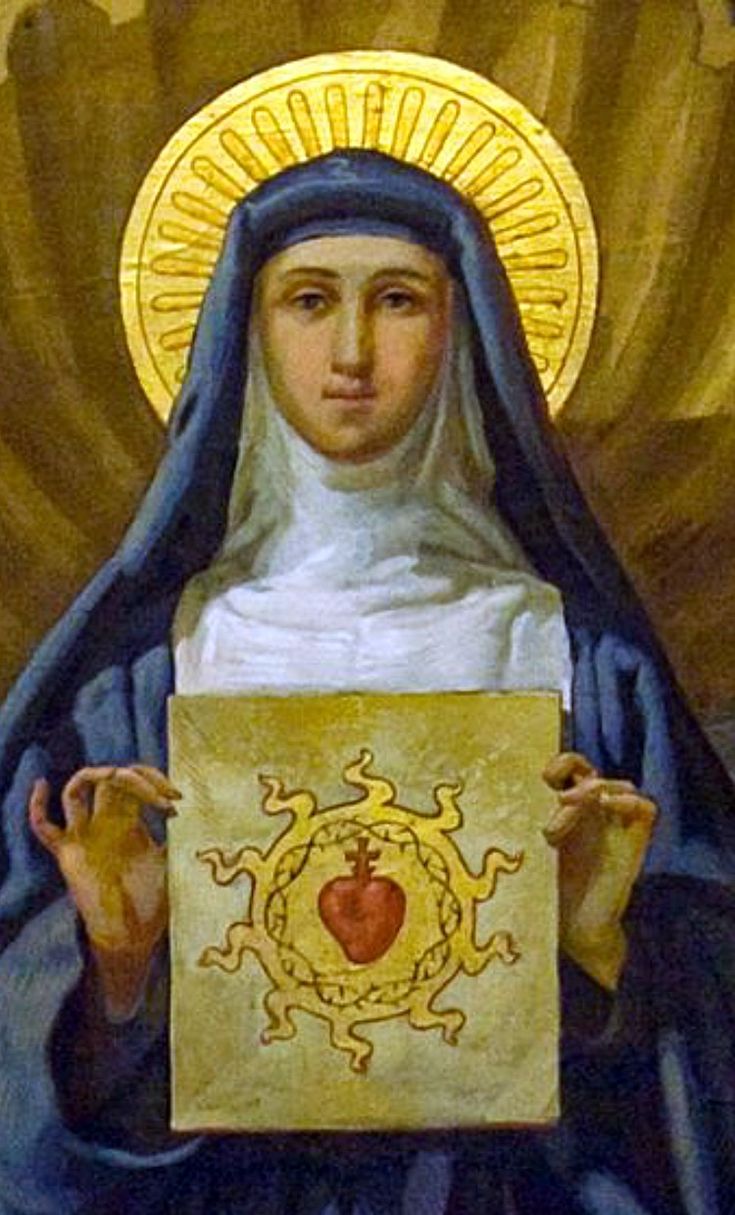
Saint Margaret Mary Alacoque (Fr. Lawrence Lew CC BY-NC 2.0)
Luis Alfonso, I know of your profound devotion to this tradition. For this reason I would like to ask you the following: how would you explain your personal consecration, that of your family, that of your home and that of your country, to the Sacred Heart of Jesus?
The consecration to the Sacred Heart of Jesus is a deeply spiritual act that involves not only a surrender to His Love and Providence, but also a commitment to Christian life. For me, this personal, family, home and country consecration turns out to be a path of total trust in God, knowing that His Sacred Heart is full of mercy and love for each one of us. Through this consecration, I seek that my entire life and that of my loved ones be centered on doing the will of God, trusting that He will provide what is necessary and guide us through all difficulties, transforming every area of our life into a reflection of His Love and His Sanctifying Grace.
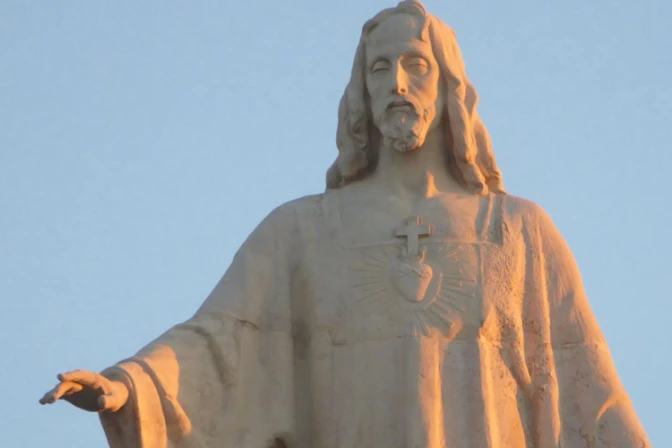
Sacred Heart of Jesus on the Cerro de los Ángeles in Getafe – Madrid (Photo: Diocese of Getafe)
Saint Joan of Arc, also known as the Maid of Orleans, was a young peasant girl who is considered a heroine of France for her role during the final phase of the Hundred Years’ War, leading the French to victory over the English. Patron of France, she turns out to be an example of firmness in faith. She died out of hatred for the divine message she brought and manifested, a martyr of the universal royalty of Christ and of the sacred and divine character of royalty in France. According to the Saint, the banner she brandished in battle was ordered by Our Lord, through the voice of Saint Catherine and Saint Margaret, who told her: “Take the banner from the King of Heaven and with courage. God will help you.”
This extraordinary woman, in her difficult supernatural mission entrusted to her since she was a child, fought not for an earthly king, but for the eternal King – Jesus Christ, King of the Universe – who occupied the center of her life and her heart. In this way, Joan of Arc teaches us with her fidelity to the mission entrusted to her, that the important thing is not only what God will ask of us, but what He asks of us now.
Luis Alfonso, what is God asking of you at this moment in your life?
God expects me to live his will in all areas of my life:
- In the family: showing love, unity and Christian education to my children and strength in our marriage.
- In society: seeking justice, solidarity, peace and the common good.
- In our country: promoting the common good, correcting injustice and fostering unity.
- In the world: preaching the Gospel, caring for creation and working for peace and global reconciliation.
Each one of us has a fundamental role in all these missions. If as Christians we live and promote these virtues and values at all levels of our lives, we will be true witnesses of the transformation that Christ wants for the world.
Saint Dominic de Guzman was a Castilian priest and Catholic saint, founder of the Order of Preachers, whose members are known as “Dominicans.” This saint is the author of this beautiful quote: “Prayer is more effective than all the weapons of war.”
According to numerous testimonies, in the year 1212 and near Toulouse, Dominic had an apparition of the Virgin Mary, who gave him the Holy Rosary (called then: “Psalter of the Virgin”). According to the account of the apparition by Blessed Alan de la Rupe, the Virgin said to him:
“Do you know, dear Dominic, what weapon the Holy Trinity has used to reform the world?” – Oh, Lady, you know it better than I – he replied – because after Jesus Christ, you were the main instrument of our salvation. “– Well, you know – she added – that the main piece of combat has been the angelic psalter, which is the foundation of the New Testament. Therefore, if you want to win those hardened hearts for God, preach my psalter.”
Luis Alfonso, what is your time of personal prayer – conversation with God – and family prayer like?
Personal prayer and family prayer are fundamental to my Christian life. Personal prayer allows me to maintain an intimate and constant relationship with God, to seek his guidance and to experience his love. Family prayer strengthens our unity, teaches us to live the faith together and reminds us that, as Christians, we are called to be a community of love and mutual support. An authentic domestic Church. Both types of prayer are essential to grow in holiness and to live the faith in a coherent way, both in private and in sharing with others, in this case, with those closest to me, who are my wife and children.
Our Mother, the Blessed Virgin Mary, is always present in our prayer. She brings us closer to Jesus who is the authentic Light of the world.
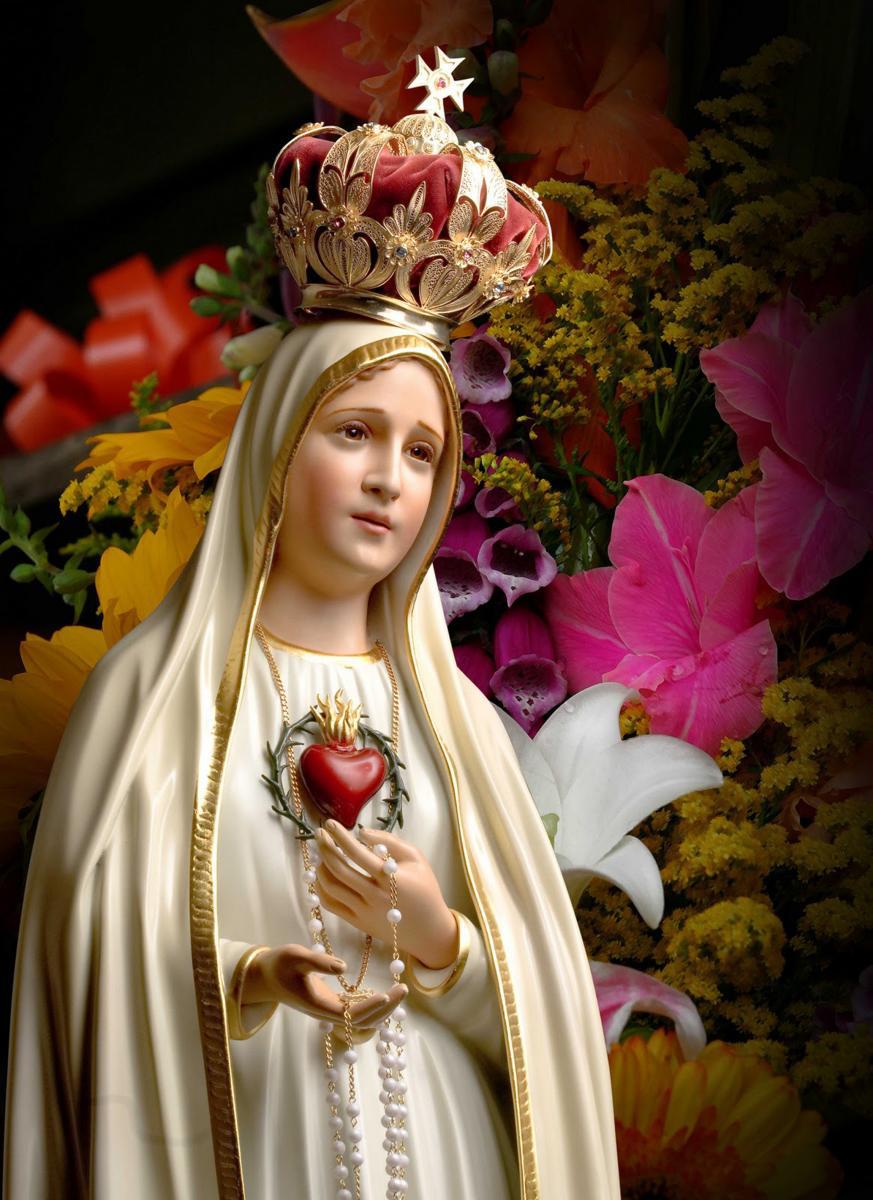
“In the end, My Immaculate Heart will triumph.” Our Lady of Fatima (Photo: Shrine of Fatima)
Saint John Paul II invited us to revive the Christian heritage of Europe in his apostolic exhortation “Ecclesia in Europa” which, together with the apostolic letter “Novo millennio ineunte”, form the program of the aforementioned Pope for the re-evangelization of the Old Continent.
As St. John Paul II said, Europe has been deeply and widely permeated by Christianity. “There is no doubt that in the complex history of Europe, Christianity represents a central and determining element, which has been consolidated on the firm basis of the classical heritage and the numerous contributions made by the various ethnic and cultural flows that have followed one another over the centuries” [Motu proprio Spes aedificandi, 1-X-1999] (n. 24).
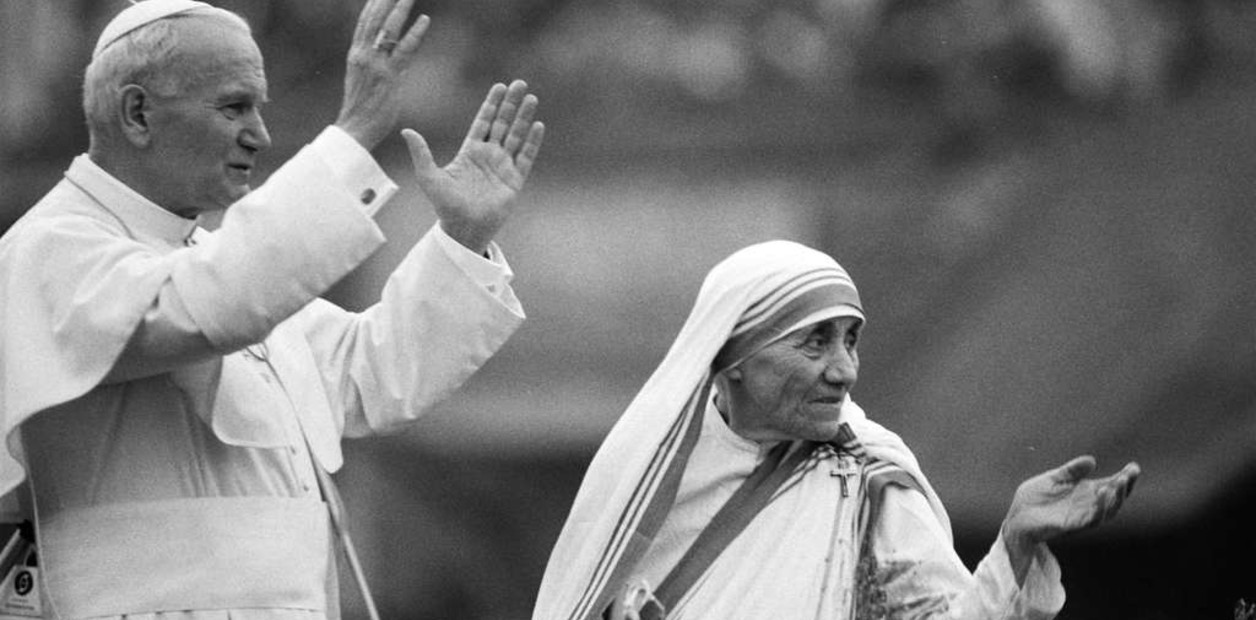
Pope John Paul II and Mother Teresa of Calcutta, February 3, 1986 (Photo: Holy See Press Office)
It is evident that in the process of building the “common European home” – in the words of St. John Paul II – it must be recognized that this building must be based on values that find their full manifestation in the Christian tradition. Keeping this in mind benefits us all. “Do not be afraid, the Gospel is not against you, but for you” said St. John Paul II, in relation to Europe.
Luis Alfonso, what are for you, those Christian virtues and values that we must recover in order to re-evangelize Europe and the world?
The re-evangelization of Europe and the world in general is an urgent and necessary challenge, especially in a context where secularism and relativism have sown doubts about the truth of the Gospel and the Christian roots of society. For this task to be effective, I believe that we must recover and live the fundamental Christian virtues and values that are not only part of our heritage, but remain deeply transformative and essential for human life and society.
These values not only respond to a spiritual need, but are also key to healing the social, political and moral crises that affect so many people at this time.
To re-evangelize Europe and the world, it is essential to recover the Christian virtues that respond not only to the spiritual need of each person, but also to the solution of the great crises facing humanity: the lack of love and charity that often translates into immense loneliness; the search for truth; social justice; peace and reconciliation; hope in the midst of adversity and true happiness that comes from the love of God.
These virtues have the power to transform hearts and change societies, and the best way to transmit them is by living them with coherence and authenticity, in our own hearts, within our families, in our communities and, beyond that, in the entire world.
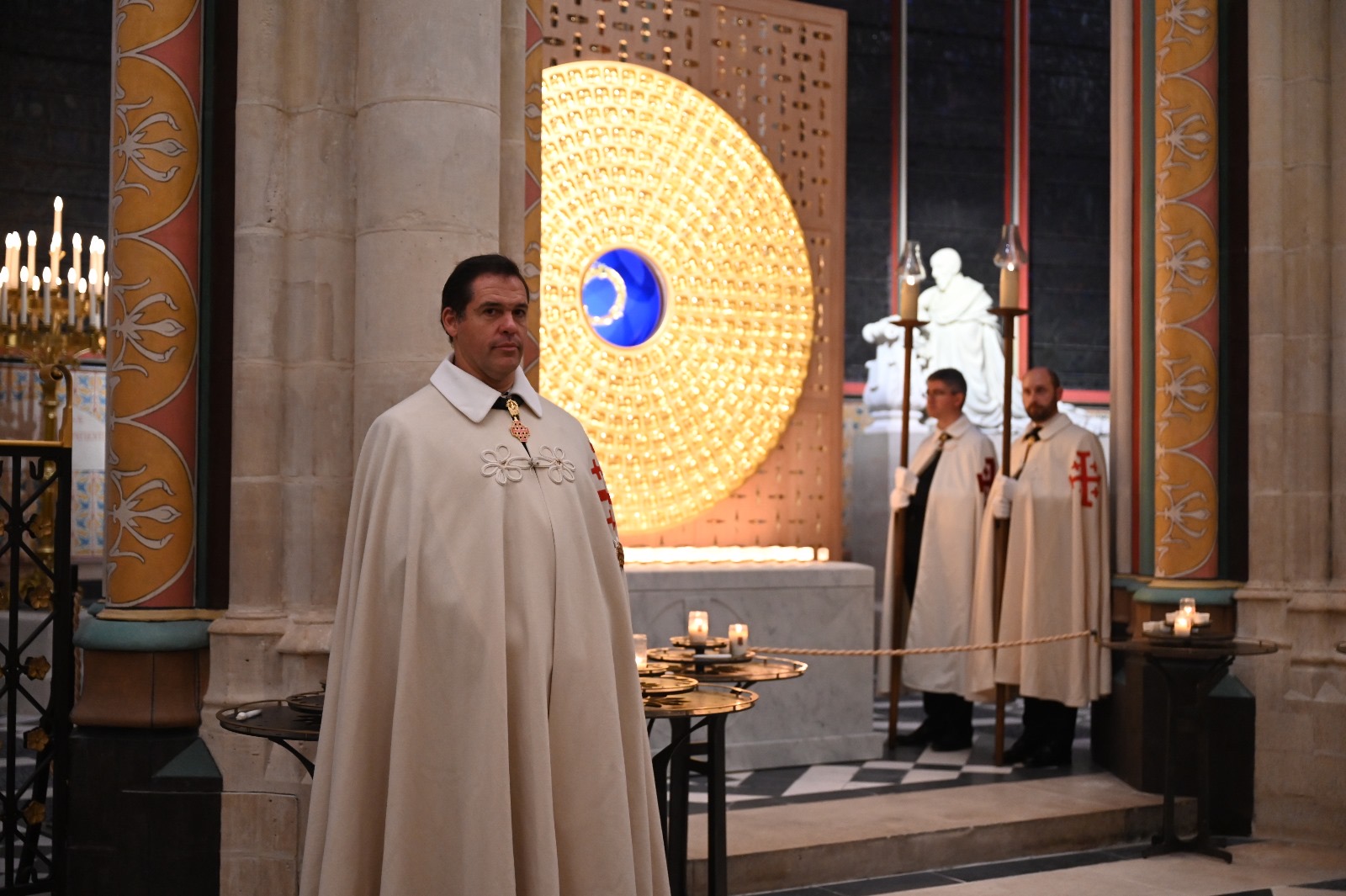
Don Luis Alfonso de Borbón with the cape of the Order of the Holy Sepulchre during the transfer of the relics of Christ in the cathedral of Notre-Dame de Paris reopened for worship in December 2024 (Photo: Press team)
Among the many memorable phrases that we could highlight from Saint Teresa of Calcutta, I would like to highlight the following: “Sometimes we feel that what we do is just a drop in the ocean, but the ocean would be less if it were missing a drop.” Another reflection that caught my attention from the saint is the following: “Yesterday is gone. Tomorrow has not yet arrived. We only have today. Let us begin.” In turn, Mother Teresa of Calcutta, the saint of “love in action,” stated that “love begins at home /…/. Only when there is love at home can we share it with our neighbors /…/. From the beginning we must teach our children to love each other.”
Luis Alfonso, are you also convinced that the change for a better world begins with oneself and in your own home? In addition to the world you would like to leave to your children, what children would you like to leave to the world?
Yes, absolutely! I believe that the change towards a better world begins with a change in ourselves and in our homes. Personal and family change is the first necessary step to transform society. If we aspire to a more just, compassionate and loving world, we must live those values in our own lives, educate our children in those principles, and be living examples of what we want to see in the world. If we educate our children in faith, in Christian virtues and in true love, we will be creating a generation of human beings who will surely be able to transform the world we leave them to make it better.
Personally – and I share this with my wife Maria Margarita – I would like to leave the world not only a more just, peaceful and respectful environment for life, but also children who proclaim the values of the Gospel, who reflect the virtues of Christ, who are witnesses of his Love and who are true builders of the Kingdom of God on Earth. This is what can make a real difference in today’s world and thus give hope for the future to present and future generations.
Ultimately, surely, changing the world begins with changing the hearts of each of us and those around us.
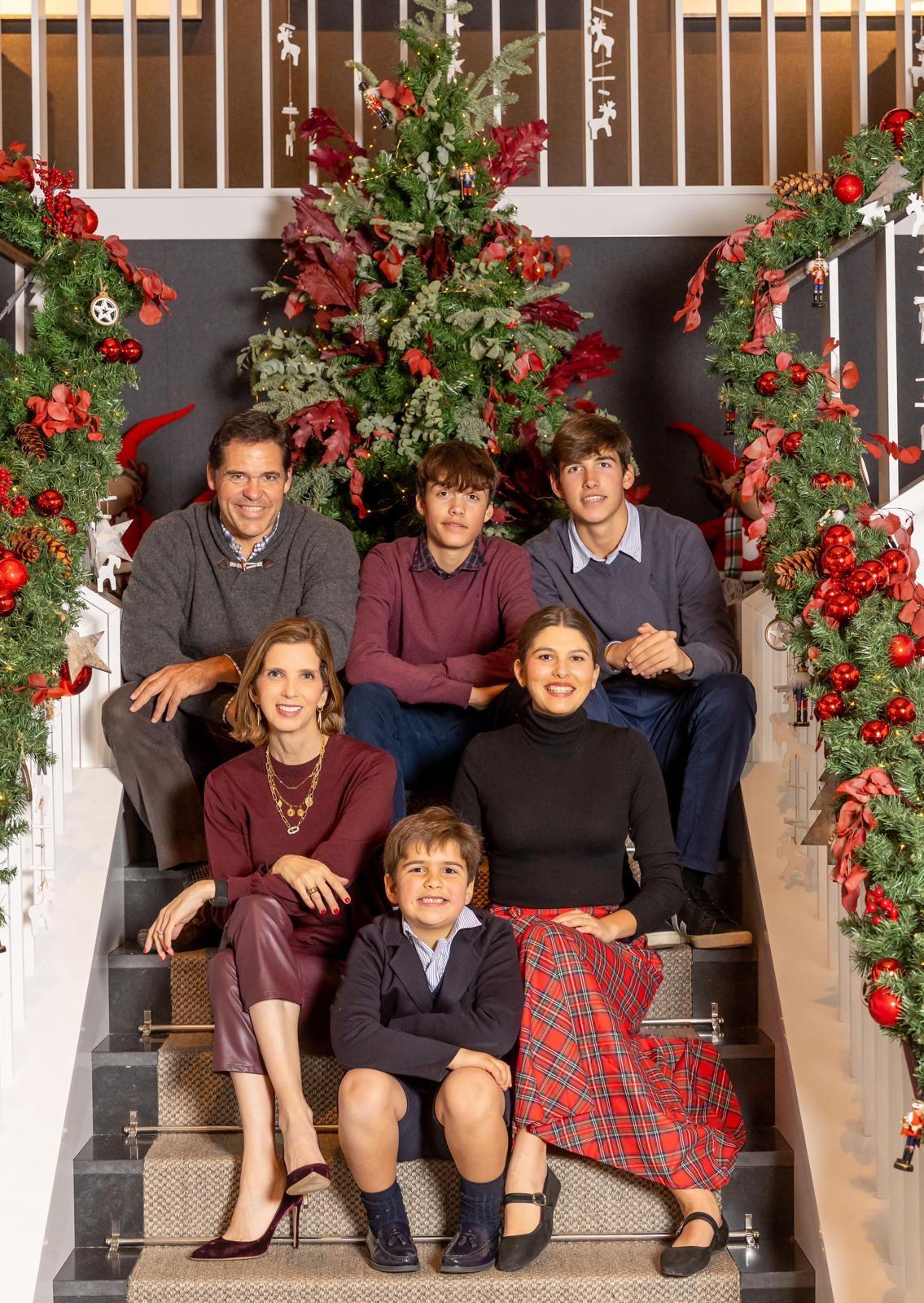
Luis Alfonso with his wife María Margarita and their children: Eugenia, Luis, Alfonso and Enrique (Photo: Family Borbón – Vargas)
Thank you very much, Luis Alfonso, for opening your heart and showing us your spirituality rooted in the Catholic faith, that intimate part of the person that we all preserve, but that, nevertheless, is so important for you to expose in these times to bear witness to the Truth, which is Jesus Christ, whom we Christians love, follow and try to imitate.
As King Louis of France did in his day, it is urgent in these times to reintroduce the truth, beauty and goodness of the Catholic faith in our world.
I am also very grateful to you for allowing us, through this conversation, to get closer to the saints, the authentic hidden influencers of God, and to get to know our friends in Heaven better so that, in this way, we can invoke their intercession through the communion of saints and can follow their testimony on our own path of sanctification.
 (EN)
(EN)
 (ES)
(ES)
 (IT)
(IT)


